|
|
|
Sort Order |
|
|
|
Items / Page
|
|
|
|
|
|
|
| Srl | Item |
| 1 |
ID:
076489
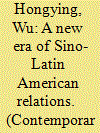

|
|
|
| 2 |
ID:
137291


|
|
|
| 3 |
ID:
082058
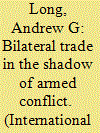

|
|
|
|
|
| Publication |
2008.
|
| Summary/Abstract |
Does the shadow of war decrease trade? I examine the influence of conflict on bilateral trade and argue that trading firms' expectations of armed conflict, both within and between nation-states, should decrease trade along with armed political violence. By assuming that firms care about future profits and assess the likelihood of a domestic or interstate conflict in the future that could disrupt trade, I argue that increasing the expectation of a domestic or interstate conflict raises the transportation, transaction, and production costs of trade. Empirically, contemporaneous trade levels should be negatively related to trading firms' beliefs about the likelihood of domestic and interstate conflicts in the future. Statistical tests, using bilateral trade data from 1984 to 1997, show that expectations of domestic or interstate conflict, in addition to violent armed conflicts, are negatively correlated with bilateral trade levels. Theoretically and empirically, this research advances our understanding of the trade-conflict relationship by demonstrating how trading firms' expectations about future conflict reduce bilateral trade levels
|
|
|
|
|
|
|
|
|
|
|
|
|
|
|
|
| 4 |
ID:
082612
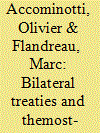

|
|
|
|
|
| Publication |
2008.
|
| Summary/Abstract |
Textbook accounts of the Anglo-French trade agreement of 1860 argue that it heralded the beginning of a liberal trading order. This alleged success holds much interest from a modern policy point of view, for it rested on bilateral negotiations and most-favored-nation clauses. With the help of new data on international trade (the RICardo database), the authors provide empirical evidence and find that the treaty and subsequent network of mfn trade agreements coincided with the end of a period of unilateral liberalization across the world. They also find that it did not contribute to expanding trade at all. This is contrary to a deeply rooted belief among economists, economic historians, and political scientists. The authors draw a number of policy lessons that run counter to the conventional wisdom and raise skepticism toward the ability of bilateralism and mfn arrangements to promote trade liberalization.
|
|
|
|
|
|
|
|
|
|
|
|
|
|
|
|
| 5 |
ID:
112542
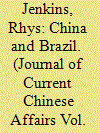

|
|
|
|
|
| Publication |
2012.
|
| Summary/Abstract |
The paper analyses the economic impacts of China's re-emergence on Brazil, looking at both the direct effects of China on Brazil in terms of bilateral trade and investment flows and the indirect effects through increased competition in export markets for manufactured goods and higher world prices for primary commodities. Despite a surge in Chinese FDI in Brazil in 2010, the main driver of bilateral relations is trade. While bilateral trade has grown rapidly, the pattern that has emerged has given rise to concern because Brazil's exports are concentrated in a small number of primary products while imports from China are almost entirely of manufactured goods that are becoming more technologically sophisticated over time. Brazil has benefitted in the short term from the high prices of primary commodities (partly caused by growing Chinese demand), but has lost export markets to China in manufactures, contributing to the "primarization" of the country's export basket.
|
|
|
|
|
|
|
|
|
|
|
|
|
|
|
|
| 6 |
ID:
059512
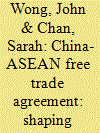

|
|
|
|
|
| Publication |
May-Jun 2003.
|
|
|
|
|
|
|
|
|
|
|
|
|
|
|
|
| 7 |
ID:
076023


|
|
|
| 8 |
ID:
187365


|
|
|
|
|
| Summary/Abstract |
This article analyses broadly the European Union’s (EU) growing geopolitical ambitions in the context of its shifting stance on China. Within the EU, it focuses on the Germany–China Comprehensive Strategic Partnership by noting the current developments and changes in the Germany–China partnership. Here, the discontinuity between the ‘old’ and ‘new’ obstacles in Germany–China trade relations is identified through an analysis of four critical issues: Germany’s Federation of German Industries (BDI) policy paper, Made in China 2025, Germany’s Industrie 4.0 and Germany’s 5G conundrum. Through the above, the article makes the argument that though there are considerable new strains on Germany–China relations and EU–China relations, concrete transformations affecting trade relations have not been observed. The article concludes by noting that the achievement of the new-found geopolitical ambitions of the EU would require a much more concentrated effort by all members rather than mere posturing.
|
|
|
|
|
|
|
|
|
|
|
|
|
|
|
|
| 9 |
ID:
109910
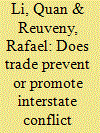

|
|
|
|
|
| Publication |
2011.
|
| Summary/Abstract |
Competing theories argue, respectively, that more trade reduces, increases, or does not affect interstate military conflict. We offer a new general theory on how trade affects conflict, which encompasses the liberal logic and the neo-Marxist/neo-mercantilist mechanism of asymmetric dependence and offers alternative explanations to the effects predicted by the bargaining and classical realist approaches. If a country expects its conflict toward a target to reduce the price of its import from or increase the price of its export to a target, it has an economic incentive to initiate conflict, and vice versa. These expectations can vary across trade flow directions and economic sectors. Using our model, we predict the effects of increases in exports and imports in five sectors on military conflict initiation. Statistical analysis of directed dyads from 1970 to 1997 largely supports our predictions. Rises in the initiator's imports of agriculture/fishery, energy, and chemical/mineral goods and exports of miscellaneous consumption goods reduce the likelihood of conflict initiation; rises in the initiator's exports of energy and both imports and exports of manufactured goods increase the likelihood. We evaluate implications for the literature and public policy.
|
|
|
|
|
|
|
|
|
|
|
|
|
|
|
|
| 10 |
ID:
077752


|
|
|
|
|
| Publication |
2007.
|
| Summary/Abstract |
Rapid economic growth in East Asia is changing the nature of international relations in the region. In the economic sphere, mercantilist policies of promoting exports and limiting imports contributed to economic tensions between rapidly growing economies in the region and the region's major trading partner, the United States. These tensions over bilateral trade issues began between Japan and United States, moved on next to South Korea and Taiwan, and have now moved from there to China. In the security field, economic growth in China is leading to a major shift in the balance of power in the region. China's steadily increasing GDP is being accompanied by a comparable rise in its military expenditures despite the fact that China faces no obvious external threats at the present time. China's long term desire to be able to defend against any outside power probably means that this increase in defense expenditures will continue for the next decade or two. North Korea continues to be a threat to stability in the region but only because of its capacity to do enormous damage in one last suicidal attack. The one area where China's rising military expenditures could lead to major confrontation on terms very different from those that would occur today is Taiwan
|
|
|
|
|
|
|
|
|
|
|
|
|
|
|
|
| 11 |
ID:
161764
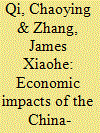

|
|
|
|
|
| Summary/Abstract |
After 21 rounds of intense negotiations over nearly a decade, the deal of China-Australia Free Trade Agreement was finally completed in late November 2014. This paper attempts to examine both the causes and consequences of this delayed conclusion by running simulation experiments on a computable general equilibrium model, to see how the free trade agreement affects the world economy not only on the two countries involved, but also on the rest of the world with a particular reference to New Zealand. Based on the simulation results, policy implications are generated.
|
|
|
|
|
|
|
|
|
|
|
|
|
|
|
|
| 12 |
ID:
078663


|
|
|
|
|
| Publication |
2007.
|
| Summary/Abstract |
Although relations between the EU and China have considerably improved over recent years, Brussels and Beijing still disagree on a number of key issues. These include the EU embargo on arms sales to China, various bilateral trade disputes, problems of illegal migration and, last but not least, Brussels' refusal to grant China MES. It is this last point that this essay will scrutinise. In doing so, it will firstly present the Chinese point of view on the question. The Chinese believe that, in view of all the efforts they have made in the course of their ongoing transition towards market economy, they deserve to be granted MES without delay. Indeed, Beijing has lately put this issue very high on its list of foreign policy priorities and, claiming that it is victim of discriminatory treatment, has been exerting ever stronger political pressure on the EU and its Member States. Yet Brussels, arguing that China does not yet fulfil the necessary requirements for being granted MES, has until now resisted this pressure
|
|
|
|
|
|
|
|
|
|
|
|
|
|
|
|
| 13 |
ID:
137814
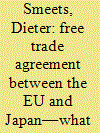

|
|
|
|
|
| Summary/Abstract |
On their summit in May 2011, Japan and the EU decided to negotiate on a Preferential Trade Agreement (PTA). Against this background, the study at hand analyzes PTAs between the EU and third countries by estimating gravity equations on a sector basis consisting of 1-digit SITC groups. On the one hand, it concludes that—except for trade in agricultural goods—PTAs increase bilateral trade above its normal level. On the other hand, that trade between the EU and Japan is undoubtedly too low with regard to distance and size. Therefore, a free trade agreement between the EU and Japan should have a considerable potential to prompt trade-creating effects that increase welfare in both countries. A necessary condition to exploit these gains is, however, not only to abolish tariffs but, more importantly, to reduce nontariff measures to trade.
|
|
|
|
|
|
|
|
|
|
|
|
|
|
|
|
| 14 |
ID:
076022


|
|
|
|
|
| Publication |
2006.
|
| Summary/Abstract |
This article considers bargaining strategies used by government negotiators in the context of bilateral trade disputes. I argue that trade officials reach the most durable agreements by using an integrative, or value-creating, strategy and avoiding the use of threats. By contrast, a highly distributive, value-claiming strategy coupled with loud public threats is unlikely to result in a durable agreement and frequently leads to deadlocked negotiations. The irony, however, is that American officials use the latter approach more frequently than the former in bilateral trade disputes. These strategies are usually chosen unconsciously in response to perceptions of losses that drive negotiators to select risky approaches to resolve disputes.
By examining bargaining strategies in the U.S. disputes with Japan and South Korea over automobiles and auto parts in the 1990s, this article identifies shifts in negotiation strategies. These shifts in approach closely track the outcomes in these two deeply contentious disputes. After protracted and contentious negotiations with Japan, the final outcome represented a failure to achieve the Americans' most important goals. A less confrontational strategy with South Korea ultimately resulted in greater market opening.
|
|
|
|
|
|
|
|
|
|
|
|
|
|
|
|
| 15 |
ID:
139866


|
|
|
|
|
| Summary/Abstract |
International Relation means the diplomatic-strategic relation of states and the characteristic focus of International Relation revolve on issues of war and peace, conflict and cooperation. Further, it is also cross border transactions of all kinds, political, economic and social
|
|
|
|
|
|
|
|
|
|
|
|
|
|
|
|
| 16 |
ID:
129420


|
|
|
|
|
| Publication |
2014.
|
| Summary/Abstract |
For nearly two decades, the representatives of the official authorities as well as public and private business entities from both Kazakhstani and Indian sides used to talk about the possibility and even the necessity of trade in strategically important types of raw products, including uranium. However, despite throughout the whole of this period, basic goods constitute the lion's share of Kazakhstan's exports to India, but bilateral trade in uranium still remains open to question. An old saying goes: 'The more you know your counterpart, the easier it is for you to deal with him', which is crucially applied to India and Kazakhstan suffering from the lack of mutual awareness. In this regard, it seems quite important to outline main economic, legislative and other aspects related to the uranium industry in Kazakhstan.
|
|
|
|
|
|
|
|
|
|
|
|
|
|
|
|
| 17 |
ID:
106487


|
|
|
| 18 |
ID:
172302


|
|
|
|
|
| Summary/Abstract |
India and Nepal have traditionally shared a unique relationship of friendship and economic cooperation. The relationship is characterised by an open and people-friendly border and is built on shared historical, cultural, linguistic and ethnic links between people residing in India and Nepal.
With Nepal being a priority under India ‘Neighborhood First’ policy, strengthening the economic relationship holds immense significance and potential for both the countries. While the political relations between India and Nepal have been extensively studied, there is not much literature that explores the economic relationship between the two nations. This is an important issue to study, as India is Nepal’s largest export market, the biggest source of its imports, the top investor of foreign capital stock and among the largest donors of foreign aid. India also provides Nepal transit facility through its territory to access seaports for trading with the rest of the world.
Given this, the main objective of this article is to suggest policy measures, which can increase bilateral trade and investment between India and Nepal. The article analyses the bilateral trade patterns and estimates the maximum additional trade potential. A wide range of issues of importance pertaining to bilateral trade, including tariffs, levy of an agricultural reform fee, under utilisation of the tariff rate quota, non-tariff measures, issues related to Rules of Origin (ROO) and physical barriers to cross-border movement of goods are discussed. The trends and changing sectoral composition of India’s investment in Nepal and barriers and opportunities for Indian investment in Nepal are also analysed. The article concludes by charting a way forward for bolstering economic cooperation between the two countries by listing down recommendations for enhancing trade, addressing non-tariff barriers, upgrading infrastructure to improve connectivity and enhancing Indian FDI in Nepal.
|
|
|
|
|
|
|
|
|
|
|
|
|
|
|
|
| 19 |
ID:
102115


|
|
|
| 20 |
ID:
124318
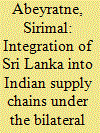

|
|
|
|
|
| Publication |
2013.
|
| Summary/Abstract |
The purpose of this article is to examine the role of Indo-Lanka Free Trade Agreement (FTA) in integration of Sri Lanka into the Indian manufacturing processes in line with emerging trade patterns based on 'global product sharing'. While Sri Lanka has established close economic ties with India in general, the FTA (2000) has led to a 'zero'-tariff regime covering a bulk of their bilateral trade. However, there is no evidence to support the popular perceptions about the deeper integration of Sri Lanka into Indian supply chains. While the expansion of Sri Lanka's trade with India under the FTA has revealed peculiar outcomes, the 'old-style' trade integration between the two countries has remained virtually unchanged. Trade and growth patterns in both Sri Lanka and India are different from the experience of East and South-east Asian countries which created opportunities to accommodate globalized supply chains of fragmented manufacturing processes.
|
|
|
|
|
|
|
|
|
|
|
|
|
|
|
|
|
|
|
|
|